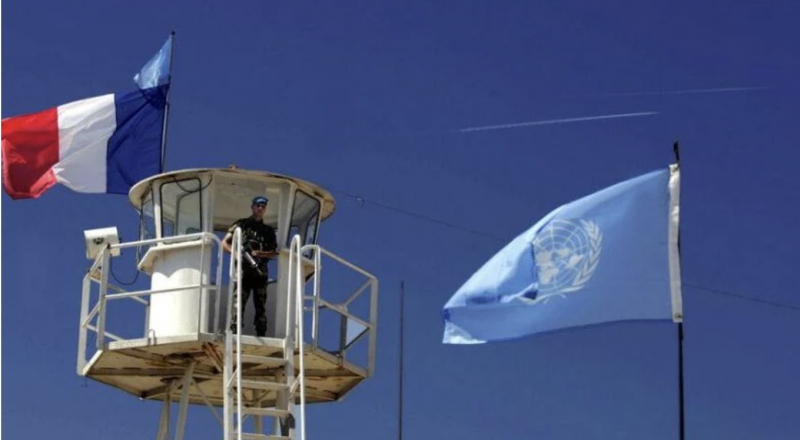
French peacekeeper stands guard on observation tower above the village of Tiri, South Lebanon, September of 2006. (Credit: Hussein Amar/AFP)
Since Oct. 7, France has increased its activity towards Lebanon in an attempt to prevent the country from escalating further. The day after the launch of Operation Al-Aqsa Flood, and Hezbollah's support of Hamas, French Foreign Minister Catherine Colonna landed in Beirut. She delivered a clear warning: If military operations on the southern front do not stop, Israel will launch an offensive that could result in major losses for Lebanon.
This was followed by a visit from Defense Minister Sébastien Lecornu, who inspected the French contingent of the United Nations Interim Force in Lebanon (UNIFIL), stating the need to preserve stability and respect Security Council Resolution 1701. This text, which put an end to the July 2006 war between Israel and Hezbollah, provides for the latter's withdrawal north of the Litani River and the deployment of the Lebanese Army and a multinational force in the border region.
During a visit to Beirut last week, Emmanuel Macron's emissary Jean-Yves Le Drian urged the extension of Lebanese Army Commander-in-Chief Joseph Aoun’s mandate. He called for stabilizing the situation in southern Lebanon, seeing the current period as an opportunity to implement 1701.
The latest French figure to enter the scene, with the same objective in mind, is Bernard Émié, head of the Directorate-General for External Security (DGSE) and former ambassador to Lebanon. A few days ago, the head of foreign intelligence held meetings with several officials during a visit kept away from the media. He held talks with Speaker of Parliament Nabih Berry, Hezbollah, troop leader Joseph Aoun and the acting director of General Security, Elias Baissari.
The French move — orchestrated in conjunction with Arab and Western countries — is part of the coordination with both Lebanese and Israeli sides, against a backdrop of international discussions aimed at restoring stability to southern Lebanon, and guaranteeing safe conditions for the Israeli inhibatinants of northern municipalities to return.
From Aug. 2006 to Oct. 7, 2023, Israel considered its front with Lebanon to be one of the coldest, due to the balance of terror, Resolution 1701 and the rules of engagement respected by both sides. This situation changed, however, after the al-Aqsa Flood. The situation in southern Lebanon is compared to what is happening in Gaza from a military point of view, but also linked to the political process in the enclave in the post-war phase. It is this formula that foreign powers are seeking to develop, and it is this message that Bernard Émié conveyed to his Lebanese interlocutors, aiming to re-establish stability on the Lebanese-Israeli border.
Among the ideas put forward for a settlement was for Hezbollah to halt its military operations in the south and withdraw the al-Radwan force, its elite unit, north of the Litani River. However, the party categorically rejected this option, assuring that clashes would continue until the end of the war in Gaza. "Hezbollah will never allow itself to be dislodged from the south. The equation is clear: Once the war in Gaza is over, the situation on the southern front will return to what it was before Oct. 7,” said a source close to the party.
Diplomacy or force?
What Bernard Émié proposed in Beirut is similar to the American proposals put forward by emissary Amos Hochstein, who insisted on the need to reach an agreement on the land border between the two countries. L'Orient-Le Jour has learned that the US administration asked Amos Hochstein to work with Lebanon to reach an agreement. Both France and the US are working to avoid escalation, and to put an end to military operations on the southern front (and lead to the withdrawal of the al-Radwan force). Their aim is to reach a settlement of the 13 points still outstanding in the land border dossier, as well as the Shebaa Farms issue, in exchange for financial assistance to Lebanon. "Mr. Hochstein is expected to present Beirut with a proposal along these lines," said a Western diplomatic source.
Najib Mikati's comments on Tuesday cannot be dissociated from Franco-American efforts. The Lebanese Prime Minister said that UN-sponsored talks were scheduled for the coming months on the implementation of Resolution 1701. "We hope that over the next three months we will have complete stability on our borders," he said. "The efforts being made are serious, with a view to reaching a settlement, based on negotiations, far from threats,” confirmed the mentioned Western diplomatic source.
However, Israeli Defense Minister Yoav Gallant has opted for a more threatening tone. On Wednesday, he declared that his country "will take Hezbollah beyond the Litani River, either through an international political settlement or through military action.” "Until Hezbollah is removed from our border, evacuated northerners will not return home," he added.
In short, this is a race between a diplomatic settlement or military escalation that will force the protagonists to come to the negotiating table. Which of these two scenarios will Hezbollah and Israel end up choosing?
This article was originally published by L'Orient-Le Jour.